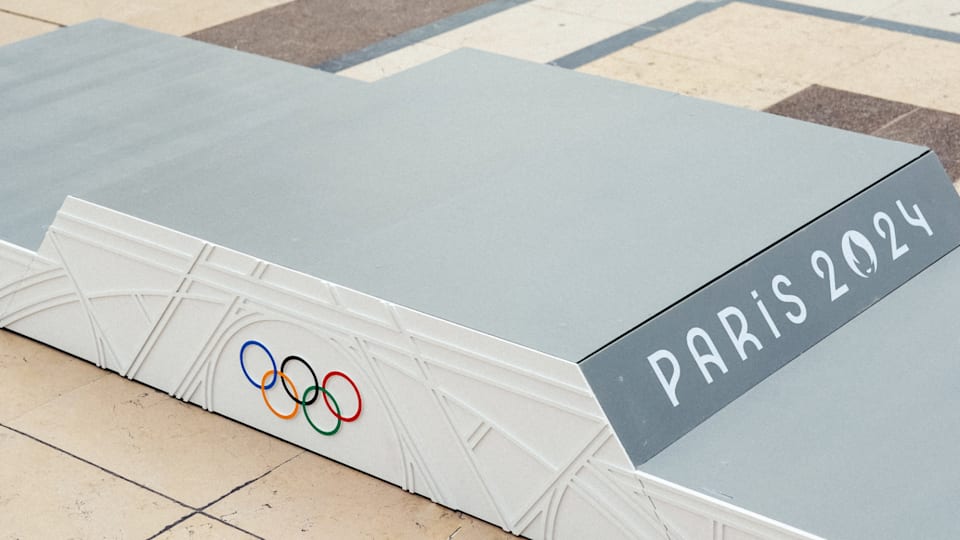Paris 2024 unveil Eiffel Tower-inspired podiums for the Olympic and Paralympic Games

Two months ahead of Paris 2024, the official podiums for the Olympic and Paralympic Games have been revealed.
The eco-friendly podiums, made by Le Pavé, Global Concept and Giffard, will be the same used at both the Olympic Games, from 26 July - 11 August, and the Paralympic Games that follow, from 28 August until 8 September 2024.
The podiums, coloured grey in homage to the rooftops of Paris and inspired by the design of the Eiffel Tower, will be used for all 329 medal ceremonies at the Olympic Games and each of the 549 ceremonies at the Paralympic Games.
"For an athlete, reaching the podium is a moment of pride, emotion and ultimate success: you put the medal around your neck and, in an instant, the dream becomes reality. You enter the history of the Games," said Paris 2024 President Tony Estanguet.
"We are pleased to reveal the podiums for the Paris 2024 Games, whose design follows the path of our medals with a piece of the Eiffel Tower within them, inspired by the lines and curves inspired by the work of the great French architect Gustave Eiffel.
"When you win a medal at the Games, you’ll feel a bit like you're climbing on top of the world, so at least the athletes will be on the top of Paris with this grey, which recalls the strong colour of the roofs of Paris.
"With these podiums made in France from French wood and 100% recycled plastic, we offer athletes a real stage where they will be proud to stand and wear the colours of their country, watched by the whole world," he added.
Paris 2024 head of design Joachim Roncin explained the challenge of incorporating the world-famous tower in the final plan.
“We reviewed lots of pictures of the Eiffel Tower and its location," he explained. "We had to find something subtle because the Eiffel Tower is vertical, and a podium is horizontal. I saw something interesting in the arch of the bridge.”
Roncin's attention to detail will not go unnoticed. Former French para swimmer and three-time gold medallist Ludivine Loiseau-Munos told reporters: “I could tell you all the podiums I’ve been on, I could even draw a sketch from memory.
"We stand back, we wait for our name, and then we look straight ahead with pride."
This podium is really beautiful. The essence of the Eiffel Tower is still there - it's really the backdrop of these Games, the Eiffel Tower. It makes you want to climb it, it makes you crave it!
Alexis Hanquinquant
An eco-friendly podium made in France
All the elements that make up the Paris 2024 podiums are French, as are the companies that created them. Start-up company Le Pavé was responsible for recycling the materials, Global Concept took charge of their construction and Giffard produced their wooden structure.
The wooden modules produced by Giffard, based near the city's Orly airport, are made from plywood. Alain Morales said his company worked jointly with Global Concept to manufacture prototypes and carry out trials to optimise the construction of 685 modules that make up each of the 68 podiums.
A suitable and adaptable podium
Practicality is at the heart of the design of the Paris 2024 podiums, and each one is assembled using a modular system; modules can be added or removed to lengthen or shorten the surface as required, with team sports needing longer podiums.
The shortest podium measures 4m in length while the longest, for Olympic football, is 33m.
The Paralympic podiums feature a similar design but are distinguished by their configuration on a single level, with a raised facade in their centre and side to facilitate accessibility. A ramp will also be added to the side for wheelchair access.
Key facts and figures of the Paris 2024 podiums
- 68 Olympic and Paralympic podiums
- 23 module types to cover all configurations
- 3 modules used to create shorter podiums (individual sports), 4m in length
- 43 modules used to create longer podiums (team sports, including football), 33m in length
- 685 modules (640 + 45 replacement modules) produced for the Olympic Games and Paralympic Games
- 45kg: the average weight of one module
- 100 per cent made in France
- 40 tonnes of recycled plastic in France